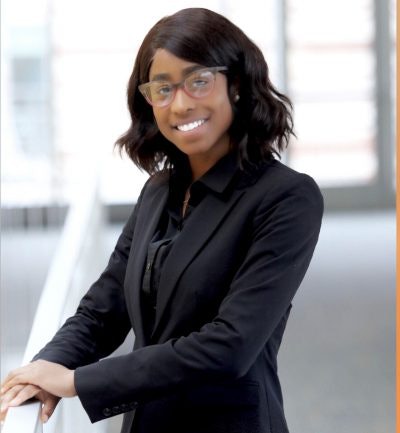When Aaliyah Brown, a senior at Florida A&M University, found out she was accepted for the 20th Thurgood Marshall College Fund (TMCF) Leadership Institute, it felt like a “big congratulatory moment.”
“You’re head over heels, you’re just super excited,” she said.
 Aaliyah Brown
Aaliyah BrownWith a cohort of 483 students selected from historically Black colleges and universities, Brown will spend five days immersed in professional networking opportunities. The conference – which kicked off virtually on Tuesday – features sessions on four major themes: financial literacy, leadership, personal branding and 21st-century skill building.
The week culminates in an online recruitment fair with Fortune 500 companies, government agencies and graduate programs, where students can secure jobs and internships with the event’s corporate sponsors, like the institute’s presenting partner Wells Fargo and companies like Amazon, JP Morgan Chase, Boeing and others.
In the opening plenary, TMCF President and CEO Dr. Harry L. Williams emphasized the caliber of the students accepted and the responsibility of participating.
“The team here spent a lot of time evaluating thousands of applications for this opportunity and for you to be selected,” Williams told the students. “Be very intentional this week. Be very intentional in terms of the focus of what you’re doing here and the reason why you’re here. You’re here because you’ve earned that right to be here and because of all of the dedication and commitment you have demonstrated throughout your journey.”
This year’s cohort is the largest class in over five years, with 41% majoring in STEM, 42% in business, 10% in liberal arts and 7% in law school, said TMCF’s Chief Programs Officer Andrea Horton. One third of this year’s cohort includes first-generation students who hold an average GPA of 3.5.
“As a class, you’re leaders,” Horton said. “You’re leading on your campuses, you’re giving back to your communities, all while working full or part-time to help finance your education. Our ultimate goal for you, for each of you, is to see you receive an amazing offer to start an unbelievable career opportunity, join a great organization and add value and open doors for other HBCU students that will come behind you.
“We are part of a collective,” she added. “We are building a narrative about the talent of HBCUs, and each of you play a role in that narrative.”
This is Brown’s first year at the annual institute, and she and her fellow students have been preparing for over a month. Through the program, she’s had mock interviews, learning modules and a skills assessment guided by TMCF staff.
“The TMCF Leadership Institute doesn’t just start day one,” she said. “It’s a long process before that in which you’re trained on how to interview, you’re trained on how to set up your resume. There’s an entire team of people who focus on your one-on-one needs.”
As a biology major who wants a role in research and executive leadership, she feels like the program is teaching her skills that have been missing from her college education.
“… In college, you’re taught technical skills,” she said. “It’s book work.” But TMCF teaches students “to find our authentic voice, to find our authentic vision for our careers and what do we want, how do we go after opportunities, how do we make that elevator pitch, how do we create that confident picture of a qualified candidate.”
This conference is a little bit different than in years past. Because of COVID-19, it isn’t in Washington D.C., where the cohorts usually gather for a packed in-person conference. Now, it’s on a virtual platform with new microlearning sessions, added breaks and breakout rooms to accommodate the format.
Williams told students that the pandemic didn’t change anything fundamental about the program, but nonetheless, it was a “historic”
 Dr. Harry L. Williams
Dr. Harry L. Williamsmoment. He also highlighted TMCF’s policy work advocating for HBCU funding amid the crisis.
“We’re fighting every day to make sure that people here in Washington D.C., they know about you,” he said, “people here in Washington D.C. understand the importance of HBCUs … They let us into their Senate offices, they let us in to their Congressional offices, and they want to know about you.”
From Brown’s perspective, the program’s pivot online is actually helping students learn how to network online and build a professional online presence, an increasingly important skill.
For Mason Hughes, a senior at Alabama A&M University, the COVID-19 adjustments haven’t changed the character of the conference – or his enthusiasm for it. It’s his second year attending what he called a “very immersive program.”
“I love the connections,” the computer science major said. “I feel like oftentimes we aren’t in environments where we can network and reach out and just ask questions.” Online, networking might look different, but “it feels amazing to be granted the opportunity to have [the leadership institute] under these circumstances. I’m just glad and excited.”
He also sees a broader message in the shift for students like himself.
“In the paths that we’re on, [we] may sometimes have to pivot,” he said. “You might have to readjust. But there’s always a path for you, because you’re the one walking it. It matters how you apply yourself every second of every day. So, don’t let obstacles or hurdles disrupt you.”
Sara Weissman can be reached at [email protected]





















